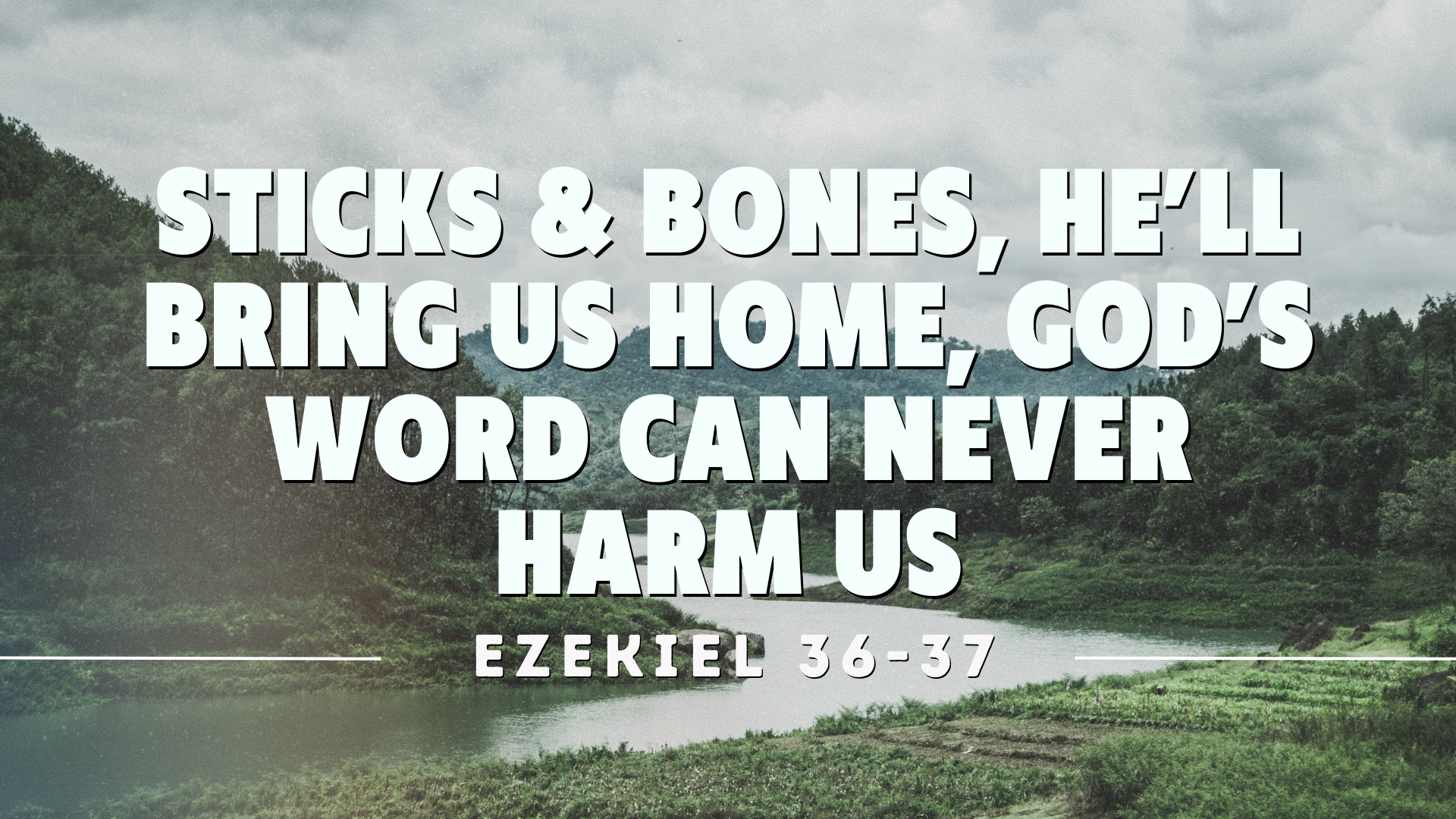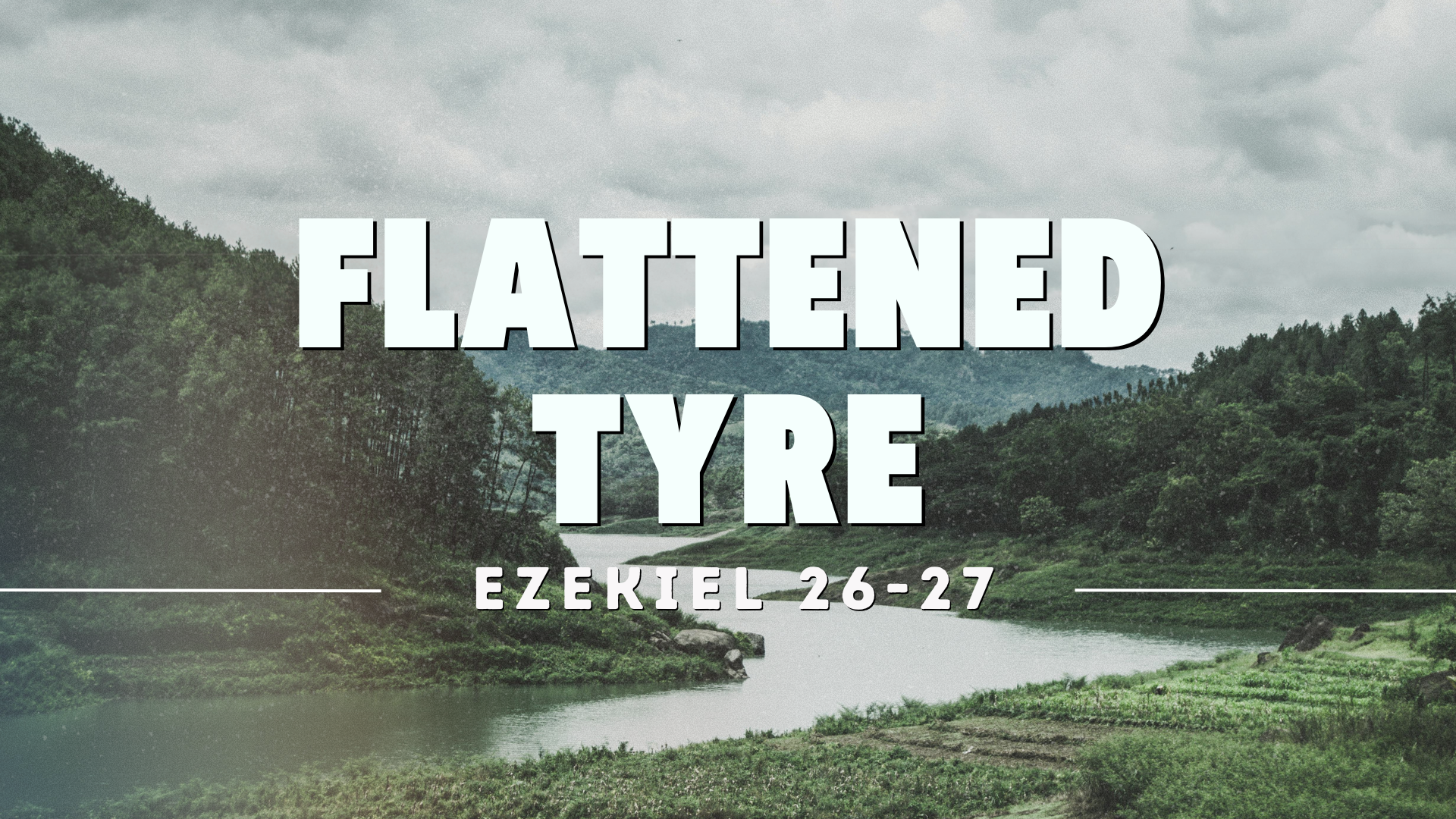
A River Flows Through It (Ezekiel 47-48)
There is a great line of dialog in the feature-film, The Fugitive.
It’s Saint Patrick’s Day in Chicago. One of the deputy US Marshalls looks at the Chicago River and comments, “If they can dye the river green today, why can’t they dye it blue the other 364 days of the year?”
It’s sarcasm conveying the sad reality that the Chicago River is contaminated. There’s no use being in d-Nile that rivers all over the Earth are contaminated. Whether by sewage, industrial waste, chemicals, or things so much more horrific, their water can sicken or kill you if consumed.
There is an extraordinary pure river in the Bible.
It is, for lack of a better word, a recurring river:
- It was in Genesis, in Eden.
- It is in the Revelation, in the New Jerusalem.
- It occurs in-between those points in history.
Most of the time it is actual and physical. You could swim in it, or fish. In one dispensation of mankind, however, it is real but supernatural.
With one exception, this river always accompanies the observable, manifested presence of God on Earth when He is dwelling among His people in a Temple:
↪ Eden was the first dwelling place of God with man. It is described as a mountain sanctuary in Ezekiel 28:13-16. In Genesis 2:10 we read, “A river flowed out of Eden to water the garden, and there it divided and became four rivers.”
↪ God would next dwell with His people in the wilderness Tabernacle. Where is the recurring River? It’s there. Because they were camping & moving, it had to move with them. It was a River Rock. Exodus 17:6 Behold, I will stand before you there on the rock at Horeb, and you shall strike the rock, and water shall come out of it, and the people will drink.”
↪ In Ezekiel 47:1-12 the river flows out from below the threshold of the Millennial Temple.
↪ In the Revelation 22:1-2 The river of the water of life, flowing from the throne of God and of the Lamb in the eternal New Jerusalem.
The only exception to the pattern is Solomon’s Temple. No river is mentioned. Perhaps that’s because God didn’t ask for a Temple. “For I have not dwelt in a house since the time that I brought up Israel, even to this day, but have gone from tent to tent, and from one tabernacle to another. Wherever I have moved about with all Israel, have I ever spoken a word to any of the judges of Israel, whom I commanded to shepherd My people, saying, “Why have you not built Me a house of cedar”[1]
God would dwell there, but it was made by man.
Ezekiel’s immediate audience was comprised of Jewish exiles. They were settled by the river Chebar. Ezekiel had been preparing them for news that Jerusalem had fallen, the walls torn down, Solomon’s Temple razed to the ground.
The Jews had no city, Temple, land, or government. Scattered across the Earth, they faced extinction through persecution and intermarriage. Ezekiel’s words gave generations hope: God would keep His promises to His beloved nation, return His presence forever, and send forth His healing, life-giving river.
Ezk 47:1 Then he brought me back to the door of the Temple; and there was water, flowing from under the threshold of the Temple toward the east, for the front of the Temple faced east; the water was flowing from under the right side of the Temple, south of the altar.
Ezk 47:2 He brought me out by way of the north gate, and led me around on the outside to the outer gateway that faces east; and there was water, running out on the right side.
It starts as a trickle, then ‘picks up stream.’ It will be a torrent, a flood.
Ezekiel is going to wish he brought his bathing suit.
Ezk 47:3 And when the man went out to the east with the line in his hand, he measured one thousand cubits, and he brought me through the waters; the water came up to my ankles.
Ezk 47:4 Again he measured one thousand and brought me through the waters; the water came up to my knees. Again he measured one thousand and brought me through; the water came up to my waist.
Ezk 47:5 Again he measured one thousand, and it was a river that I could not cross; for the water was too deep, water in which one must swim, a river that could not be crossed.
He was able to walk across at ankle depth, then at knee depth, then waist deep.
The fourth time he was unable to walk across on his own. He mentions swimming, but thinks better of it, probably on account of the current.
Ezk 47:6 He said to me, “Son of man, have you seen this?” Then he brought me and returned me to the bank of the river.
Ezk 47:7 When I returned, there, along the bank of the river, were very many trees on one side and the other.
Ezk 47:8 Then he said to me: “This water flows toward the eastern region, goes down into the valley, and enters the sea. When it reaches the sea, its waters are healed.
The Dead Sea is not just ‘mostly dead.’ It is 6x saltier than the oceans. It cannot sustain life. That is, not until the Millennial river enters it. The Dead Sea will then be “healed.”
If water becomes contaminated, there is no amount of pure water that you can add to it that will render it potable. In the once-great state of California, more than 735,000 people are still served by the nearly 400 water systems that fail to meet state requirements for safe and reliable drinking water.
Don’t be alarmed: The water in Riverdale is safe to drink.
God’s water purifies and cannot be in the least corrupted. I hate to say it, but it is holy water. It’s not in a basin for you to tap on your forehead. In fact that is unholy water. In 2013, researchers at the Institute of Hygiene and Applied Immunology at the Medical University of Vienna tested holy water from 21 Austrian churches and found that 86% of the samples contained bacteria normally found in fecal matter (like E. coli) along with other microbes.
No wonder it burns the demon-possessed when splashed on them.
Ezk 47:9 And it shall be that every living thing that moves, wherever the rivers go, will live. There will be a very great multitude of fish, because these waters go there; for they will be healed, and everything will live wherever the river goes.
Ezk 47:10 It shall be that fishermen will stand by it from En Gedi to En Eglaim; they will be places for spreading their nets. Their fish will be of the same kinds as the fish of the Great Sea, exceedingly many.
This is a little insider information for believers. You might want to invest some of your portfolio in fishing futures.
Ezk 47:11 But its swamps and marshes will not be healed; they will be given over to salt.
Every now and then you get a reminder that the Millennium is not Heaven.
Ezk 47:12 Along the bank of the river, on this side and that, will grow all kinds of trees used for food; their leaves will not wither, and their fruit will not fail. They will bear fruit every month, because their water flows from the sanctuary. Their fruit will be for food, and their leaves for medicine.”
The same river is in the New Jerusalem, in Eternity: “And he showed me a pure river of water of life, clear as crystal, proceeding from the throne of God and of the Lamb. In the middle of its street, and on either side of the river, was the tree of life, which bore twelve fruits, each tree yielding its fruit every month. The leaves of the tree were for the healing of the nations” (Revelation 22:1-3).
From Genesis to Revelation, and into Eternity, it is the same River. The River of the Water of Life.
As the vision continues, from 47:13 through 48:35 reveals the following:
The Boundaries of the Land (47:13-23).
God defines Israel’s inheritance.
Foreigners who dwell among them share in it.
The Tribal Portions (48:1-29).
Each tribe receives a fair, orderly allotment.
A central holy portion is reserved for priests, Levites, the city, and the prince.
The City and Its Gates (48:30-34).
Twelve gates, named for the tribes, surround the city.
Immigration is in the news. Israel welcomed immigrants. But they had to embrace Israel’s God and obey His commandments. It was legal immigration, compassionate but enforced.
Skip to the very end of the last verse: “And the name of the city from that day shall be: THE LORD IS THERE (v35).
We would say, Jehovah Shammah, or YHWH Shammah.
- There are no vowels in ancient Hebrew.
The Hebrew Bible was originally written with consonants only. God’s name appears as the four letters Y H W H (called the Tetragrammaton, four letters in Greek). Without vowels, the exact pronunciation is uncertain. - By around the 3rd-2nd century BC, Jewish tradition considered the name too holy to say aloud, except perhaps by the High Priest on the Day of Atonement. Instead, they substituted Adonai (“Lord”) when reading Scripture. Over time, the true pronunciation was lost.
I ran across something I found super interesting that I never heard before. I was watching a video by Chuck Missler. He said that a respectful pronunciation, one still practiced today, is to simply say the letters in sequence.
Y=Yode… H=Hay…W=Vahv
Yode – Hay – Vahv – Hay
I know what you’re wondering. Am I going to talk about the one dispensation when the recurring river is supernatural and not physical?
It is right now, the Church Age. It is us. Your body individually, and Christian gathers corporately, are the Temple of God on Earth.
1Cor 3:16 Do you not know that you are the Temple of God and that the Spirit of God dwells in you?
2Cor 6:16 …For you are the Temple of the living God. As God has said: “I WILL DWELL IN THEM AND WALK AMONG THEM. I WILL BE THEIR GOD, AND THEY SHALL BE MY PEOPLE.”
Where is the river? Jesus: “He who believes in Me, as the Scripture has said, out of his heart will flow rivers of living water.” But this He spoke concerning the Spirit, whom those believing in Him would receive; for the Holy Spirit was not yet given, because Jesus was not yet glorified” (John 7:38-39).
God the Holy Spirit was “given” to the Church on the Day of Pentecost. From that point forward, every person who believes God and is saved receives the permanently in-dwelling Holy Spirit.
The Church is not in the Old Testament. We are a mystery revealed by the apostle Paul in the New Testament. Nevertheless, there are universal truths and encouragements that we can draw from Ezekiel as a fellow believer.
The river in Ezekiel’s vision was a torrent flowing down from the Millennial Temple. In our dispensation, the torrent is the resident power and purity of God the Holy Spirit flowing from the hearts of believers.
The first three times that Ezekiel stepped into the river, he was able to walk with little resistance. He crossed over to the other side on his own. But the fourth time, he couldn’t. Ezekiel was “Up to his neck” in River!
We need to be very careful interpreting this. We immediately see a progression from less dependence upon the Holy Spirit to more dependence on Him. Commentators like this:
- Ankle deep is initial trust in Jesus.
- Knee deep is growing obedience.
- Waist deep is deeper dependence.
- Neck-deep water (fully swimming) is total surrender and empowerment.
That’s awesome… Or is it? It isn’t. I’m guessing that most of the fathers here didn’t teach their kids to swim by throwing them in the middle of a fast running river.
BUT: Sink or swim seems to be a strategy our Heavenly Father employs. Think of the disciples in the Upper Room waiting for “the power of the Holy Spirit.” Do you think they had any idea at all about what was going to happen? They were still asking Jesus if he was going to inaugurate the Kingdom right then. When the Lord ascended, they all hung around as if something was going to happen.
No, when Pentecost came, they were thrown into almost total chaos. The sound of a rushing wind came out of nowhere; there were little tongues of fire hovering over them; they each spoke in a human language they did not know; they were immediately accused of dishonoring God by being drunk.
This was no ankle deep initial dependence upon the Holy Spirit. They were thrown into something they had never prepped for. Just like every Bible character I can think of.
The trees nourished by the Millennial River have leaves that can be used to heal. The Holy Spirit wants to use you to heal people. Sometimes physically, all the time spiritually. After all… You’ve got a river of life flowing out of you, Makes the lame to walk and the blind to see. Open prison doors, set the captives free. I’ve got a river of life flowing out of me.
*********************************************************
From Genesis to Revelation, and from Eden to eternity, God’s desire is made known.
📖 Old Testament
- Exodus 25:8 “Let them make Me a sanctuary, that I may dwell among them.”
- Leviticus 26:11-12 “I will set My dwelling among you… I will walk among you and be your God.”
- Psalm 132:13-14 “The LORD has chosen Zion… ‘This is My resting place forever; here I will dwell.’ ”
- Zechariah 2:10-11 “I am coming, and I will dwell in your midst,” declares the LORD.
📖 New Testament
- John 1:14 “The Word became flesh and dwelt among us.”
- John 14:16-17 “The Spirit will dwell with you and be in you.”
- John 14:23 “If anyone loves Me… My Father will love him, and We will come to him and make Our home with him.”
- First Corinthians 3:16 “You are God’s temple, and God’s Spirit dwells in you.”
- First Corinthians 6:19 Your body is a temple of the Holy Spirit who is in you.
- Revelation 21:3 “Behold, the tabernacle of God is with men, and He will dwell with them.”
God has made His desire known. Charles Spurgeon said,
“God’s desire has always been to dwell with His people. In the wilderness He walked in the Tabernacle, in Jerusalem He filled the Temple, and in the Church He lives by His Spirit. And at last, in the new heaven and earth, the tabernacle of God shall be with men.”
| ↑1 | First Chronicles 17:5-6 |
|---|








